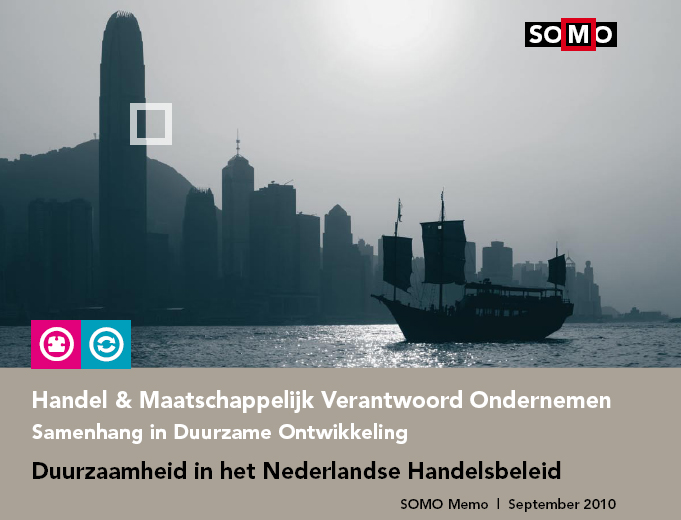
Sustainability considerations of the Dutch government
The effectiveness of sustainable development and the fight against poverty is partly dependent on policy coherence. For this reason, SOMO is presenting a series of Dutch papers on practical and idealistic considerations in the area of trade and Corporate Social Responsibility (CSR). The recently published second paper ‘Sustainability in Dutch Trade Policy’, focuses on social and ecological considerations in Dutch trade policy. In recent years, the Dutch government has made various commitments in this area. The memo could urge a potential new right-wing cabinet to actually convert commitments made into concrete policy.
Deregulation and free trade can contribute to economic growth. But it has also become clear that free trade goes hand-in-hand with negative consequences for people and the environment, such as poverty, health problems, human rights violations and environmental pollution. Also by the Dutch government the awareness is growing that these effects will not be solved by the market itself, and that effective intervention by authorities is necessary (unilateral, regional and global). However, there is often a lack of clarity regarding the possibilities to deal with concerns about the environment or social issues by means of trade measures.
In the Netherlands, moral considerations are personified proverbially by ‘the vicar’, and trade considerations by ‘the merchant’. With a possible CDA-VVD cabinet on the horizon, it would be a step in the right direction if the government were to pay more heed to potential conflicts between these two ‘gentlemen’. Self-regulation by the market has turned out to be a bankrupt concept, and it is therefore of the utmost importance that CSR is incorporated into trade agreements. The Dutch government should therefore increase the pressure within the EU to integrate social, human rights and environmental aspects into EU trade treaties.
Trade and CSR are inextricably linked to one another. The seperate SOMO papers show this. Trade agreements, export credit insurance and trade missions (the subjects of the papers) have along with trade and investment components a clear CSR aspect, although too little attention is paid to it. The second paper Sustainability in Dutch Trade Policy is primarily intended for people who already have some knowledge of the issue. SOMO encourages them to use this information to embed sustainability considerations systematically in future Dutch trade policy.
Related news
-
 CSDDD Datahub reveals law covers fewer than 3,400 EU-based corporate groupsPosted in category:News
CSDDD Datahub reveals law covers fewer than 3,400 EU-based corporate groupsPosted in category:News David Ollivier de LethPublished on:
David Ollivier de LethPublished on: -
 Additional evidence filed against Booking.com for profiting from illegal settlementsPosted in category:News
Additional evidence filed against Booking.com for profiting from illegal settlementsPosted in category:News Lydia de LeeuwPublished on:
Lydia de LeeuwPublished on: -
 The hidden human costs linked to global supply chains in ChinaPosted in category:News
The hidden human costs linked to global supply chains in ChinaPosted in category:News Joshua RosenzweigPublished on:
Joshua RosenzweigPublished on:

